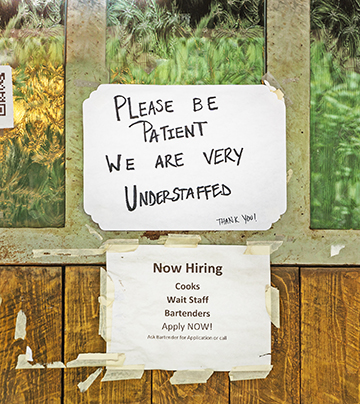Shop Local Marketplace
The Shop Local Marketplace will offer independent businesses a national online market, increasing their revenue, creating jobs and providing an alternative to Amazon. Perhaps most important, the businesses will keep 100% of their revenue and the platform will be run by an experienced nonprofit.
The Local Business Institute (LBI) is developing the Shop Local Marketplace, an online shopping portal featuring goods and services from independent vendors. While sites like Amazon dominate e-commerce, local businesses end up sacrificing significant revenue and their own branding to participate. Although COVID brought momentum to the Buy Local movement, for consumers there is no convenient online alternative to those “big box” outlets.
The Shop Local Marketplace provides local business owners and consumers with an alternative to the dominant online retailers where policies and costs can be prohibitive. With organization partners representing and reaching more than one million local businesses across the country, LBI is poised to succeed where others have fallen short.
Participating vendors will benefit from shared resources like professional design and marketing, secured payments and search engine optimization. Those struggling to stay open will find new revenue opportunities. Those not yet selling online can ramp-up or pivot. Those already managing e-commerce will amplify reach and visibility. The Local Marketplace will help level the playing field for vendors so often left out of large-scale solutions. This project will promote all participating local businesses with additional features to highlight multi-ethnic, minority-owned, woman-owned, LGBTQ and veteran-led vendors.
Hoover Institute Presentation
Empowering Small Business with Big Technology
September 28, 2022
Our strength as a nation depends on the American dream. That dream is fueled by entrepreneurs, specifically America’s small, local businesses. During the COVID shutdown in 2020, one third of our independent businesses were pushed out of business while big-box online retailers continued to thrive earning record profits. How do we help thousands of local businesses not only survive, but thrive? At the same time, how do we enable small businesses to adopt and benefit from the latest technologies? The answer lies in a single solution.
An online marketplace, built from the advanced technology of Web3, will offer a national and even worldwide market to locally-owned businesses across America. An infrastructure of technology paired with local businesses and their customers can ignite local economies everywhere—in small towns, rural communities, underserved communities and large cities.
Key Points:
• In 2018, even before the pandemic, small retail businesses surveyed by the Institute for Local Self-Reliance revealed that 90% of businesses reported that Amazon had a negative impact on their revenue. 28% described the degree of negative impact as “significant”. The Marketplace will reclaim that online market for local businesses because they will receive 100% of their sale price.
• Independent, locally-owned businesses are the economic backbone of the communities in which they operate. They recirculate a larger proportion of total revenue in the wages and profits paid to local residents. And they contribute more of their revenue to local charitable causes.
• Independent businesses produce outsized tax revenues for local government in the districts they occupy, and enhance the value of surrounding residential areas.
• The dominance of Amazon and E-Bay severely limit online sales options for independent businesses and subject them to extraordinary fees. Independent businesses of all kinds are searching for ways to reach consumers where they are and our communities will benefit from helping them do so.
• The Marketplace will provide an expanded market for small local businesses in an environment built specifically for them using the latest Web3 technologies.
• Phase One is the business to consumer marketplace. Phase Two is the business to business marketplace which will offer small businesses easy access to technologies along with training.
Contact: Bob Murray at Terranet Ventures: info@terranetventures.com or Rebecca Melançon, LBI: Rebecca@localbusinessinstitute.org.
How an online marketplace for local business can change America
The economic health of America lies not in the accumulation of individual wealth but in the greater exchange of dollars in local communities across the country. The current income disparity reaches far beyond individual bank accounts. The unbridled growth of the top 1% has prospered at the expense of the middle class, leaving communities less sustainable and with lower growth rates.
Our strength as a nation depends on the American dream. The dream was never to create a society where a few select individuals own most of the country. It was that everyone have a chance at middle class. “A chicken in every pot” is a long way from a class of billionaires.
Yet the problem is not the ultra rich. The problem is the lack of middle class. It is the middle class that spends money, keeping the economy floating. All the giant companies and individuals with offshore bank accounts are useless if the general public can’t afford to buy products.
The solution does not lie solely in taxing the ultra rich. It lies in building the middle class. Small business creates and supports a middle class. Grow this and the country flourishes in a sustainable and more equitable way.
Economic Inequality
The path to middle class can come from two directions: high paid manufacturing jobs not likely to return to the US and business ownership. Only business ownership offers the opportunity to build generational wealth. Between 2005 and 2015, the number of small retail businesses in the U.S. fell by 85,000 according to Census Data. Then, during the COVID shutdown in 2020, tens of thousands more independent businesses were pushed out of business while big-box online retailers continued to thrive earning record profits. In 2018, even before the pandemic, small retail businesses in a survey by the Institute for Local Self-Reliance reveals that 90% of businesses reported that Amazon had a negative impact on their revenue. 28% described the degree of negative impact as “significant”.
A note on Amazon—yes, small businesses can sell on Amazon. But that sale comes at such a high cost that it leaves little to no profit for the business. Other options such as Groupon come at such a high cost that it can literally put people out of business.
In a 2011 study, Goetz and Fleming analyze 2,953 counties, both rural and urban, and find that after controlling for other factors that influence growth, those with a larger density of small, locally owned businesses experienced greater per capita income growth. The presence of large, non-local businesses, meanwhile, had a negative effect on incomes. (Does Local Firm Ownership Matter?, Stephan Goetz and David Fleming)
The size of a firm is directly related to its own income inequality. A 2015 paper finds that much of the dramatic increase in income inequality over the last two decades may be owed to consolidation in the economy and the growing market power of a small number of very large firms. Large firms pay higher wages on average than small firms do, but there’s significant variation across different types of workers. At large firms, low- and medium-skilled employees earn about the same or a little less than their counterparts at small firms, while high-skilled employees are paid significantly more than similar positions at smaller companies. In other words, the gap between the best-paid workers and everyone else is much greater at big corporations than it is at small and medium-sized businesses. Using data from 1981 to 2010 on wages and the size of firms in 15 countries, the authors find a strong relationship between growth in the average firm size and rising levels of income inequality, particularly in the U.S. and U.K. They also find that in counties, such as Sweden and Denmark, where average firm size has stayed the same or declined, income inequality has grown much less. The paper concludes: “Our results suggest that part of what may be perceived as a global trend toward more wage inequality may be driven by an increase in employment by the largest firms in the economy.” (Wage Inequality and Firm Growth.” Holger M. Mueller, Paige P. Ouimet, and Elena Simintzi, LIS Working Paper 632)
The Shop Local Marketplace is designed to grow small local business by expanding their market. With the business retaining 100% of their revenue, the Marketplace puts money in the hands of thousands of local businesses instead of one person. These dollars are then recirculated in the community adding to local sales taxes and creating jobs.
Economic Impact
Numerous studies throughout the country over the past 20 years have shown that dollars spent at a local retailer recirculate in the local economy producing an impact 3-5 times that of national chain. The first such study, completed in Austin, Texas in 2002 showed that $45 out of every $100 spent at a local retailer stayed in the Austin economy. At a typical chain retailer, that figure was just $13, the rest disappearing from the local economy at the end of the business day.
A similar study in Chicago showed a 70% increase in local impact per square foot in local business vs chain and big box retailers. This so clearly illustrates both the recirculation of dollars and the efficient use of resources. (The Civic Economics of Retail.)
Independent businesses spend more on local labor, goods procured locally for resale, and services from local providers. This means a much larger share of the money spent at a locally owned store stays in the local economy, supporting a variety of other businesses and jobs. (Indie Impact Study Series: Salt Lake City, Utah, Civic Economics, Aug. 2012)
From a national perspective, the recirculation of these dollars builds more sustainable and resilient local economies which builds a stronger nation. Each time the money is spent, we collect taxes that fold back into our local, state and national coffers. The billions sitting in offshore accounts create no benefits whatsoever for our communities and country. It is only in the circulation of money by our citizens that we grow and thrive. Our nation is nothing but a collection of communities. Build the strength of the communities and the nation will be stronger.
Rural Economies
Small, locally owned rural business have additional challenges to accessing and securing a customer base simply by their geography. Our Marketplace solution can improve gaps in growth rates for small businesses in rural areas. Currently, rural small businesses have a growth rate of 0.06%, but small businesses in metropolitan counties have grown by more than 3 times the rate (1.9%) over the same time. (Source: SBA)
That matters to us because in many rural states, more than 50 and even 60% of the workforce is working for small businesses. Vermont, Wyoming and Montana have more than 60% of their workforce employed by small businesses. North Dakota, Kansas, Idaho, Alaska, Louisiana, Maine and Hawaii have more than 50% employed by small businesses. Much of this is rural without access to the commerce of large cities. (SBA)
With a solution like the Shop Local Marketplace, businesses can reach a wider audience, and participate in the e-commerce boom without losing revenue to big corporations. When these business owners spend their newfound revenue at other local businesses and hire from their rural communities, we raise the economic health of the community and the country.
Employment
There are more than 30 million small businesses in America employing almost 60 million people and providing more than 65% of net new jobs. Growing this segment of the economy grows the nation. (How Many Small Businesses are in the US?, Fundera Data & Reports)
These jobs are more stable as well. The average tenure of an employee at a local business is 4.1 years. It is 9-12 months at a typical Amazon facility. Growing one job at 1,000 local businesses is easier, more cost effective and stable than relocating one business that may bring 1,000 jobs.
Conclusion
During Covid, wealth held by billionaires increased 70%. Imagine a country where this wealth was in the hands of thousands of local business owners recirculating in thousands of communities. By growing local businesses, we help provide a sustainable economic ecosystem. This grassroots approach to a health local economy building a healthy national economy is being adopted by major governmental funders such as the SBA and the EDA in their granting guidelines. They see the wisdom of investing locally to thrive nationally.
WHO IS THIS FOR?
cuustomers and local business
Category
ECONOMIC DEVELOPMENT
PARTNER ORG
TBA









